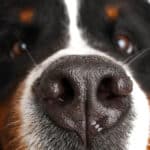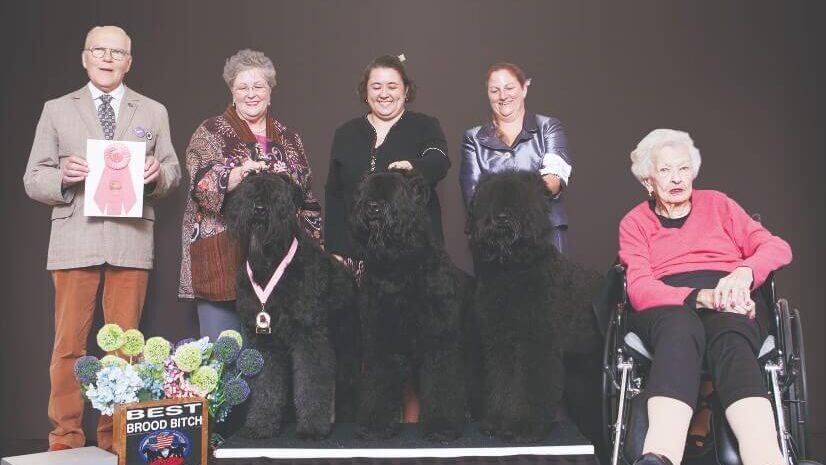
Home » ZolaRoza Black Russian Terriers | Kaye Shipley & Layne Shipley Townsend

Kaye Shipley & Layne Shipley Townsend
1. Our names are Kaye Shipley and Layne Shipley Townsend. We are a mother and daughter duo who are passionate about dogs. Currently, we both reside in Georgia, although that may change soon! We have been breeding Black Russian Terriers (BRT) for approximately ten years now and have always had dogs in our homes as members of our family.
Our kennel name is ZolaRoza. That name is a nod to the late Dana Kellerman and Julie Parker, who brought some of the finest French Black Russian Terrier lines to the United States, and a heartfelt nod to the first Black Russian who stole Kaye’s heart, Rozie. Dana and Julie bred the first litter of Excellent to Excellent hips, and the dogs they bred were consistently recognized in the Conformation ring for spectacularly correct movement. The pedigrees behind our ZolaRoza BRTs are some of the best in the world.
Our most recent litter was a total outcross and co-bred with us by Betty Lou Shipley, our Mother and Nana. Sadly, we said goodbye to her at the age of 97 in June of 2023. She fell in love with our breed and enjoyed the show life for the five years she lived and traveled with us.
We do have thoughtfully planned breedings for fall of 2024 and sometime in 2025. Prior to any breeding, we conduct extensive pedigree research for health and type. ZolaRoza Black Russians are selectively bred to reflect our goals as preservation breeders.
As AKC Breeders of Merit, our ZolaRoza BRTs are recipients of multiple AKC awards AND breed club awards, including Best Brood Bitch, Awards of Merit, several Top Dam awards, and numerous BRTCA breeder awards for producing healthy Black Russian Terrier AKC Champions and Grand Champions. We have finished many dogs from the Bred-By Exhibitor Classes over specials.
Layne took her bitch, Freyja, to Westminster in 2022 where Freyja was awarded Select Bitch by well-known AKC Judge Teresa Hundt. Layne and Freyja have been invitees to the NOHS Finals for many years. Recently they received an Award of Excellence from Mr. Edd Bivin at the AKC National Championship. Together as a breeder/owner-handled team, Layne and Freyja have attained the NOHS Silver level and are currently ranked No. 11 Overall and No. 3 Black Russian Terrier Bitch in the NOHS Lifetime Rankings, according to AKC.
2. Like most Working dog breeders, we observe pack dynamics and individual personalities in a litter as they grow. At 49 days of age, we conduct the Volhard Aptitude Test with the help of some very experienced friends from our all-breed Conyers Kennel Club and other experienced dog fancy community members here in Georgia. We always have several experienced dog breeders evaluate our litters for conformation.
At ZolaRoza, we look for a confident, conformationally correct puppy who is curious and loves to please. Kaye is particular about a correct topline (when free-stacked and at play), tail-set, parallel head planes, and correct bite. Layne is a stickler for a correct front assembly, rear drive, shoulder layback, bold attitude, and correct coat. We both hone in on a coordinated, balanced-moving pup!
At ZolaRoza, our puppies are whelped and raised inside our home until they are ready to join their owners or families at about 12 weeks of age. Black Russian Terriers are not kennel dogs! They require a lot of constant training, grooming, and work, so they aren’t the right breed for everyone. Additionally, we do not feel our breed is an appropriate Service Dog because they were selectively bred as an extremely independent thinking, protective, working guard and military dog.
3. In our view, we are seeing some inconsistency in type awarded in the Conformation ring. This is likely attributed to our relatively rare, young breed and a limited gene pool. We strongly feel, as guardians of the breed, that we should not try to reproduce trends in the show ring but stay true to the Breed Standard with our judges’ education seminars, and continuously encourage our national breed club to stand firmly behind the original Standard and purpose of the Black Russian Terrier, with health as a top priority.
In our view, some lines are losing robust bone and substance, correct front assemblies, rear drive, balanced and effortless movement, and correct coats. These Black Russian Terriers should not be awarded in the Conformation ring because of the inability to perform the work they were originally bred to do.
Fortunately, overall health seems to be an important focus for Black Russian Terrier breeders today, as well as reliable and predictable working temperaments. This coincides with an increased popularity in a variety of AKC performance sports among newer Black Russian Terrier owners, which is wonderful! We love to see the same enthusiasm for Conformation competition, as this is the AKC venue where breeding stock are evaluated, showcased, and rewarded.
4. Sadly, we have lost a great number of exceptional Working dog judges over the last several years. There are fewer judges who had the opportunity to experience direct “hands on” examination of the robust, heavier-boned, and serious Black Russian Terriers of nearly twenty years ago.
The type we prefer in our ZolaRoza breeding program is a robust, heavy-boned, minimally sculpted, serious and aloof dog with correct, energy-conserving movement. Our AKC Breed Standard has clearly defined the desired height for dogs and bitches. However, overall balance in movement should be considered rather than absolute size.
We are in the Southeast and occasionally travel to other regions for Conformation shows. We are never in need of finding a show! It’s not difficult to pull a major together, as the Southeast has a very large Black Russian Terrier community. For example, our very first BRTCA Eastern Regional Specialty in Perry, Georgia, drew an entry of over forty exhibitors in Conformation alone!
5. Social media is a double-edged sword in our sport. It’s a great tool to connect, inform, collaborate, educate, and share information within the fancy. However, it can also be used to plagiarize, misrepresent, and cause displays of unsportsmanlike conduct—usually with minimal or no consequence. This is unfortunate and off-putting to those who are interested in or new to the fancy.
6. New exhibitor involvement, a family atmosphere, and good old-fashioned fun seem to be some of the challenges we increasingly see the loss of in our dog show community.
One way we have personally overcome these challenges in our sport is to broaden our mentor base and community of friends in dogs—beyond the Black Russian Terrier community and outside the United States. We have some wonderful, dedicated, and honest mentors in the international community whom we turn to for advice. We have found that our “dog show family” should not be limited to friends in our breed. Great knowledge and constant learning occur with many people who have a lifetime of experience in other breeds. That’s not to say we don’t love our Black Russian Terrier family—you know who you are!
At ZolaRoza, we always make time to answer questions and speak to people interested in the sport of purebred dogs or our beloved Black Russian Terriers. Our personal goals at ZolaRoza are to assure that everyone feels welcomed, interested, educated, and included in the sport of purebred AKC dogs!
7. We are thrilled to see more Owner-Handlers and Breeder/Owner-Handlers exhibit their own dogs. Also, initiatives put forth by professionals in the sport to ensure the safety of all at dog events has been overdue and is welcomed. Several times, when Layne was a novice Owner-Handler, there were instances in which she was made uncomfortable, but we did not know the appropriate protocols for redress.
We were fortunate to have our all-breed club members and people we now call dear friends support and guide us over the years.